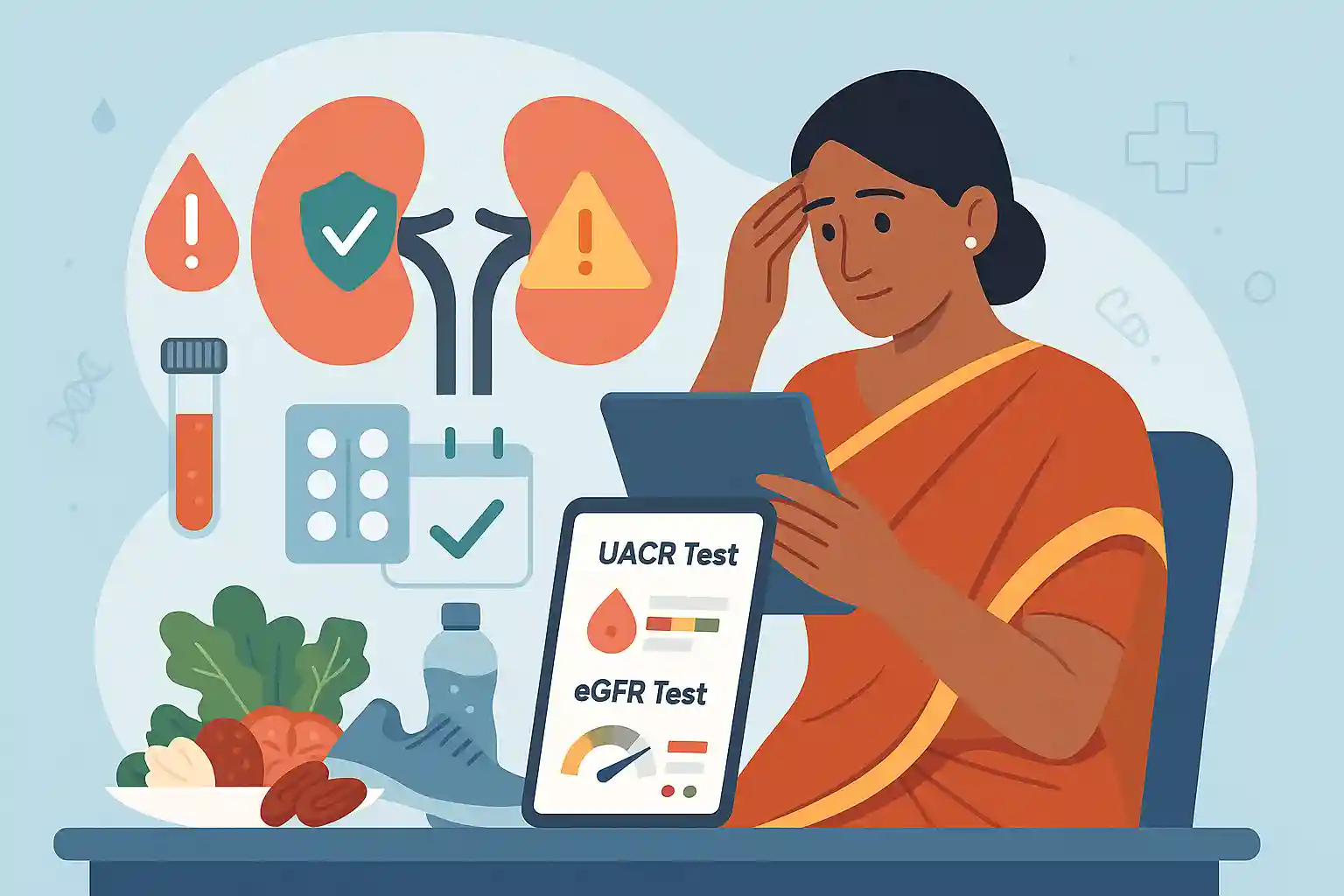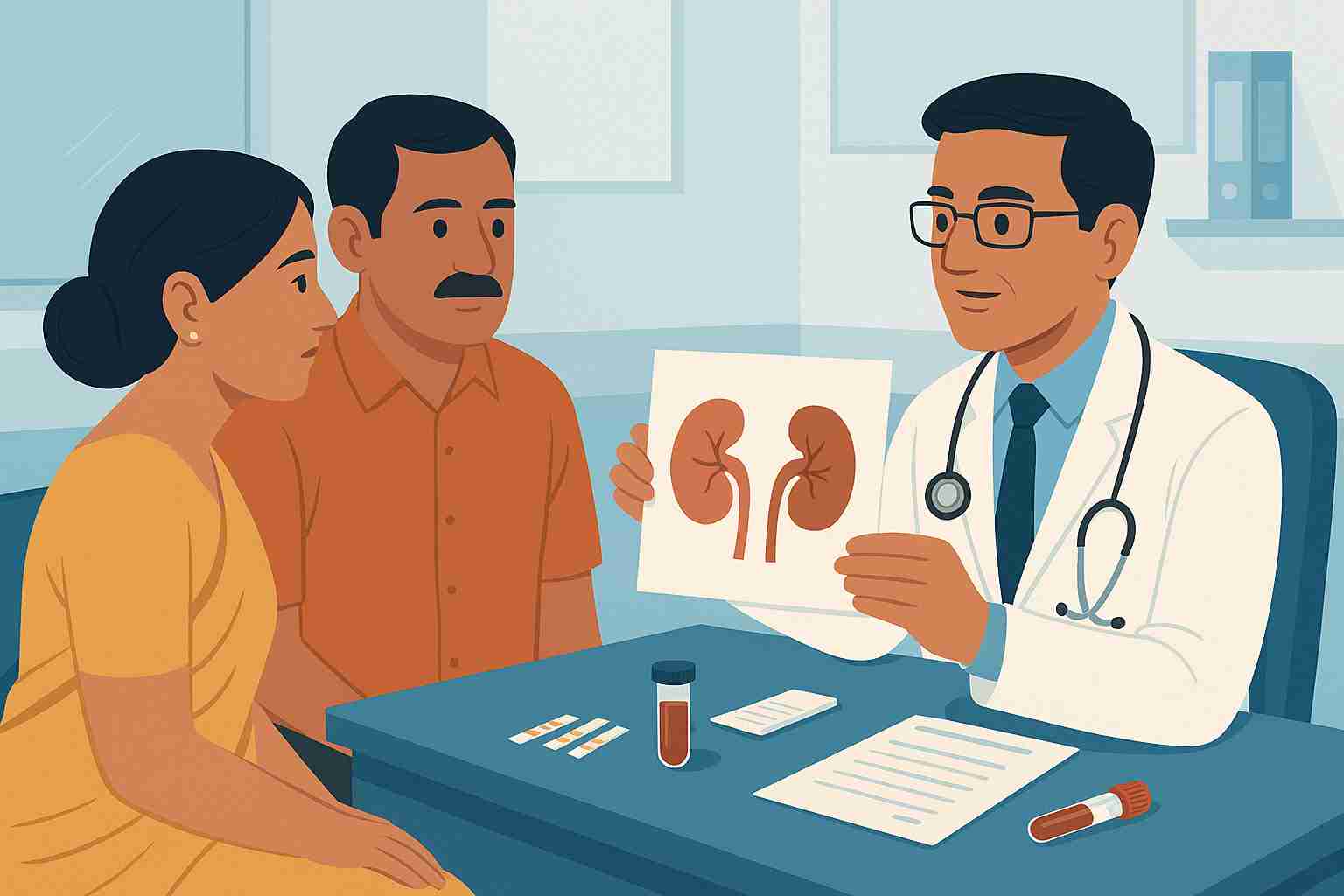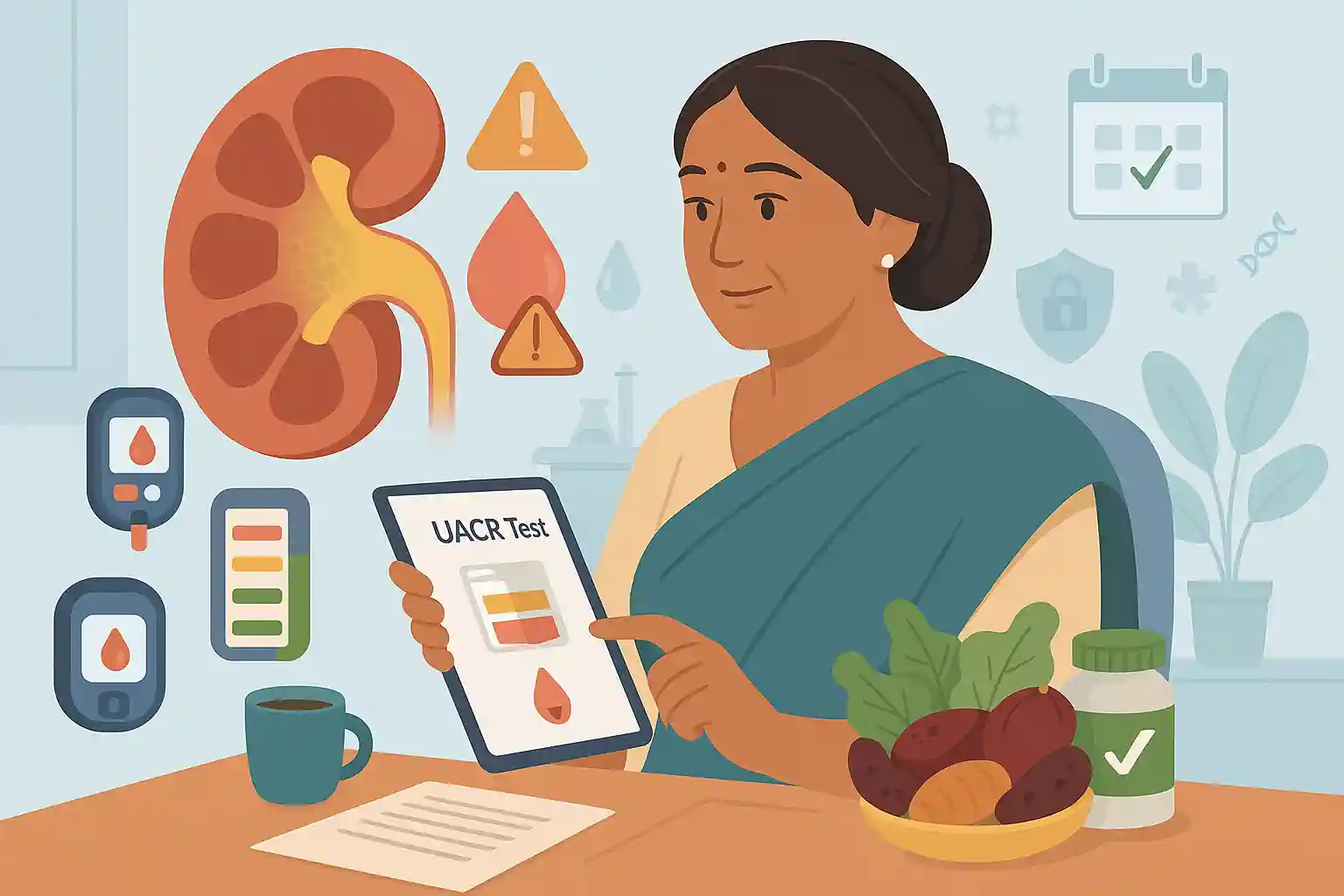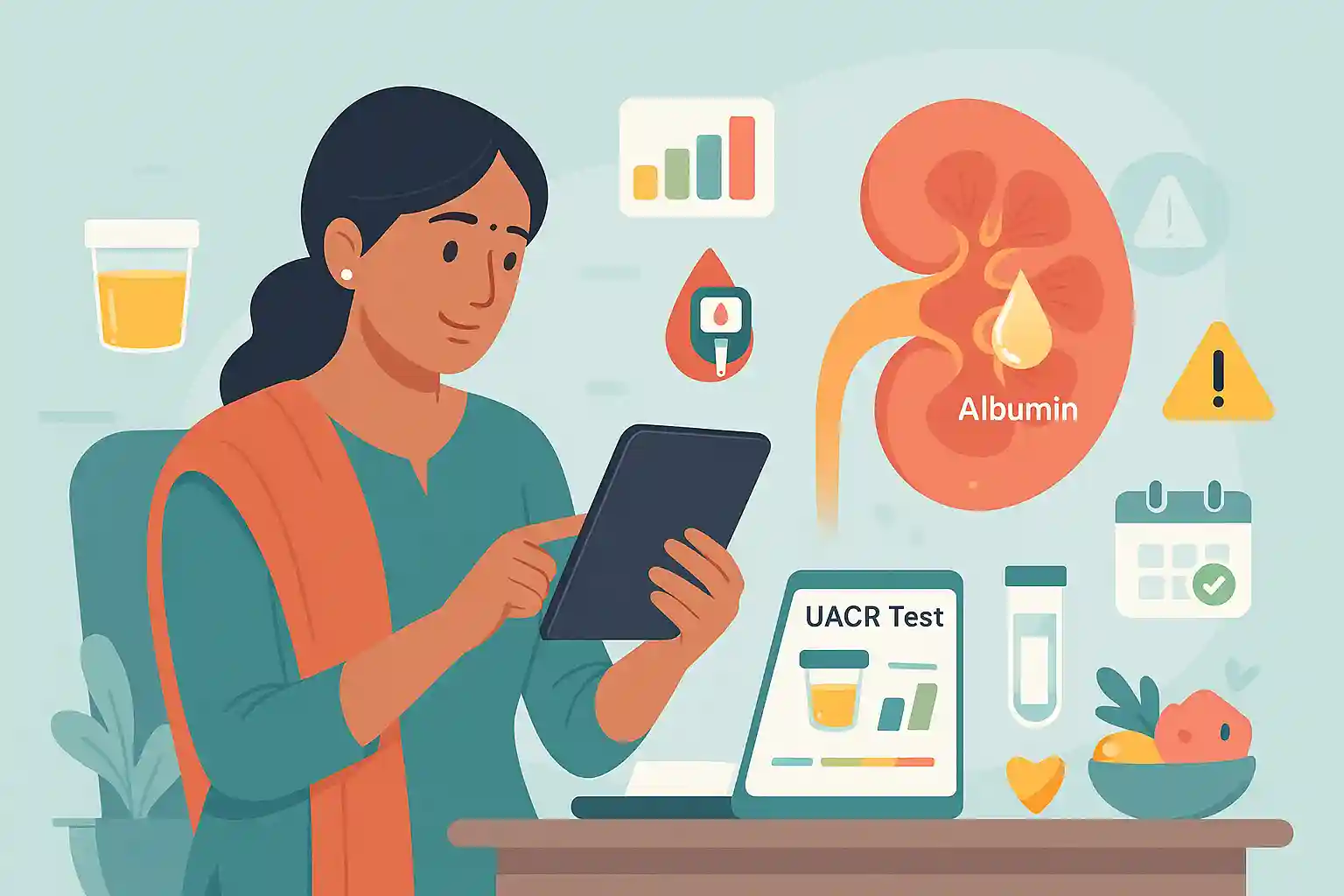101 million Indians have pre-diabetes, but here's what most don't realize: your kidneys are already in danger. While you're focused on preventing diabetes, silent kidney damage may already be occurring. The window to protect your kidneys is now—before you become diabetic and complications become irreversible.
UACR and eGFR tests can detect kidney problems 5-10 years before symptoms appear. For pre-diabetics, these tests aren't optional—they're essential for preventing a future of dialysis and kidney transplants.
Why Pre-Diabetics Need Kidney Testing
Understanding Pre-Diabetes in India:
- HbA1c: 5.7-6.4% or Fasting glucose: 100-125 mg/dL
- 101 million Indians have pre-diabetes (2019 data)
- 70% will develop Type 2 diabetes within 10 years
- Kidney damage can start during pre-diabetic stage
- Indians develop complications earlier than other populations
The Hidden Kidney Risk:
- High blood sugar damages kidney filters even before diabetes diagnosis
- Insulin resistance affects kidney function directly
- 25% of pre-diabetics already have early kidney damage
- Kidney disease accelerates progression to diabetes
- Early detection allows complete reversal in many cases
UACR Testing: Your Early Warning System
What UACR Measures:
- Albumin protein leakage in urine (earliest sign of kidney damage)
- Detects problems 5-10 years before symptoms
- Simple morning urine test
- More sensitive than basic urine protein tests
UACR Values for Pre-Diabetics:
- Normal: Less than 30 mg/g (kidneys healthy)
- Early damage: 30-300 mg/g (action needed now)
- Significant damage: Above 300 mg/g (urgent treatment)
- Target for pre-diabetics: Keep below 30 mg/g
eGFR Testing: Measuring Kidney Function
What eGFR Shows:
- How well kidneys filter waste from blood
- Calculated from creatinine level, age, and gender
- Expressed as mL/min/1.73m² (kidney filtration rate)
- Decreases with kidney damage progression
eGFR Values and Kidney Health:
- Normal: 90+ mL/min/1.73m² (healthy kidneys)
- Mild reduction: 60-89 mL/min/1.73m² (early concern)
- Moderate reduction: 30-59 mL/min/1.73m² (significant damage)
- Severe reduction: 15-29 mL/min/1.73m² (prepare for dialysis)
- Kidney failure: Less than 15 mL/min/1.73m² (dialysis needed)
Who Needs Testing and When
High-Risk Pre-Diabetics (Test Every 6 Months):
- HbA1c 6.0-6.4% (closer to diabetes range)
- High blood pressure (BP > 130/80 mmHg)
- Family history of diabetes or kidney disease
- Overweight with central obesity
- Age over 45 years
Moderate-Risk Pre-Diabetics (Test Annually):
- HbA1c 5.7-5.9% (early pre-diabetes)
- Normal blood pressure
- No family history of kidney disease
- Age under 45 with good overall health
Test Preparation and Accuracy
For Accurate UACR Results:
- Collect first morning urine sample
- Avoid testing during fever or urinary infection
- Don't exercise vigorously 24 hours before
- Inform lab about all medications you're taking
For Accurate eGFR Results:
- Fast for 8-12 hours before blood test
- Avoid meat consumption the night before
- Stay well-hydrated but don't overdrink water
- Inform doctor about muscle-building supplements
Cost and Accessibility in India
Test Costs:
- UACR test: ₹300-600 (private labs)
- Serum creatinine (for eGFR): ₹200-400
- Combined kidney function panel: ₹800-1200
- Government hospitals: ₹100-300 for both tests
- Home collection: Additional ₹100-200
Where to Get Tested:
- Primary Health Centers: Basic testing available
- District hospitals: Comprehensive kidney panels
- Private diagnostic centers: Quick results and convenience
- Corporate health checkup packages often include both tests
What Your Results Mean
Best Case Scenario (Normal Results):
- UACR < 30 mg/g + eGFR > 90: Kidneys are healthy
- Continue lifestyle modifications to prevent diabetes
- Repeat testing annually
- Focus on maintaining current kidney health
Early Warning Signs (Abnormal Results):
- UACR 30-300 mg/g: Early kidney damage - still reversible
- eGFR 60-89: Mild kidney function decline
- Immediate action needed to prevent progression
- Repeat testing every 3-6 months
Serious Concern (Multiple Abnormalities):
- UACR > 300 mg/g or eGFR < 60: Significant kidney damage
- Urgent nephrology consultation required
- Aggressive intervention to prevent kidney failure
- May need to start diabetes medications even in pre-diabetic stage
Prevention Strategies for Pre-Diabetics
Blood Sugar Control:
- Target HbA1c below 5.7% (reverse pre-diabetes)
- Low glycemic index Indian foods: Brown rice, dal, vegetables
- Intermittent fasting under medical guidance
- Regular blood sugar monitoring
Blood Pressure Management:
- Target BP below 130/80 mmHg
- Reduce salt intake to less than 5g daily
- DASH diet principles adapted for Indian cuisine
- Home BP monitoring weekly
Lifestyle Interventions:
- Weight loss: 5-7% reduction prevents diabetes progression
- Exercise: 150 minutes moderate activity weekly
- Quit smoking completely
- Limit alcohol consumption
- Stress management through yoga or meditation
Medical Interventions When Needed
Medications for High-Risk Pre-Diabetics:
- Metformin: Prevents diabetes progression and protects kidneys
- ACE inhibitors/ARBs: For high BP and kidney protection
- Statins: If cholesterol elevated
- Low-dose aspirin: For cardiovascular protection
When to Start Medications:
- UACR consistently above 30 mg/g
- Blood pressure above 130/80 mmHg
- HbA1c above 6.0% despite lifestyle changes
- Strong family history of diabetes complications
Success Stories: Prevention Works
Real Outcomes with Early Action:
- 58% diabetes risk reduction with lifestyle changes
- Early kidney damage can be completely reversed
- Progression to kidney failure prevented in 90% of cases
- Healthcare costs reduced by 60-70% with early intervention
- Quality of life significantly improved long-term
Your Immediate Action Plan
This Week:
- Get HbA1c test if not done in last 3 months
- Schedule UACR and eGFR testing
- Check blood pressure at home or pharmacy
- Start a food and activity diary
This Month:
- Complete kidney function testing
- Consult doctor about results and risk assessment
- Begin structured lifestyle modification program
- Set up regular monitoring schedule
Next 3 Months:
- Repeat HbA1c to assess progress
- Follow-up kidney testing if initial results abnormal
- Evaluate effectiveness of lifestyle changes
- Consider medications if targets not met
The Bottom Line
Pre-diabetes is your last chance to prevent both diabetes and kidney disease naturally. UACR and eGFR testing aren't just recommended—they're essential for protecting your future health. The tests cost less than ₹1000 but can save you from ₹5+ lakh dialysis costs later.
Don't wait until you become diabetic to worry about your kidneys. The damage happening now is still reversible, but only if you act quickly. Every month of delay reduces your chances of complete recovery.
Take control before it's too late. Get tested, understand your risk, and commit to the lifestyle changes that can prevent a lifetime of health complications. Your future self will thank you for the proactive steps you take today.



